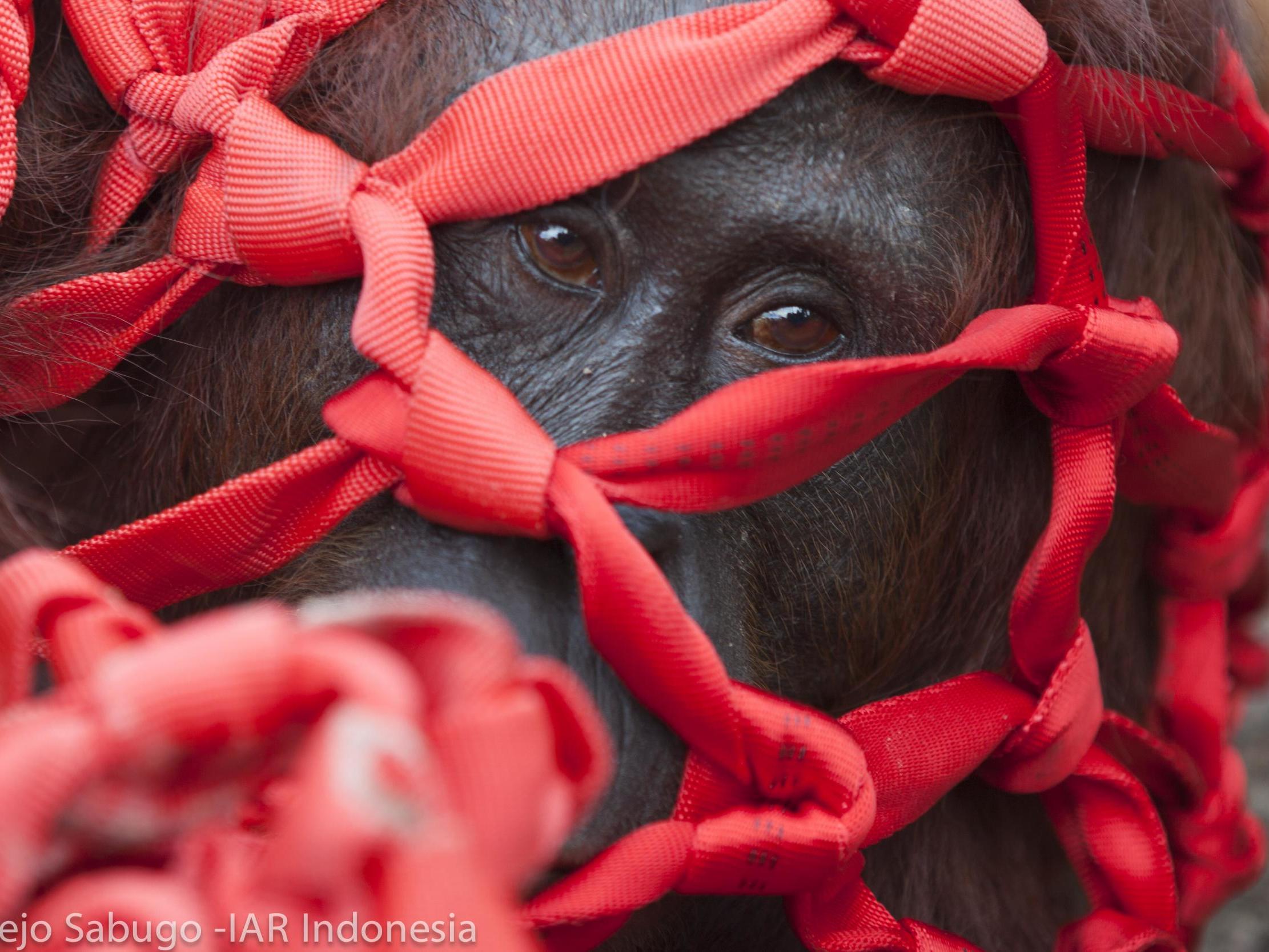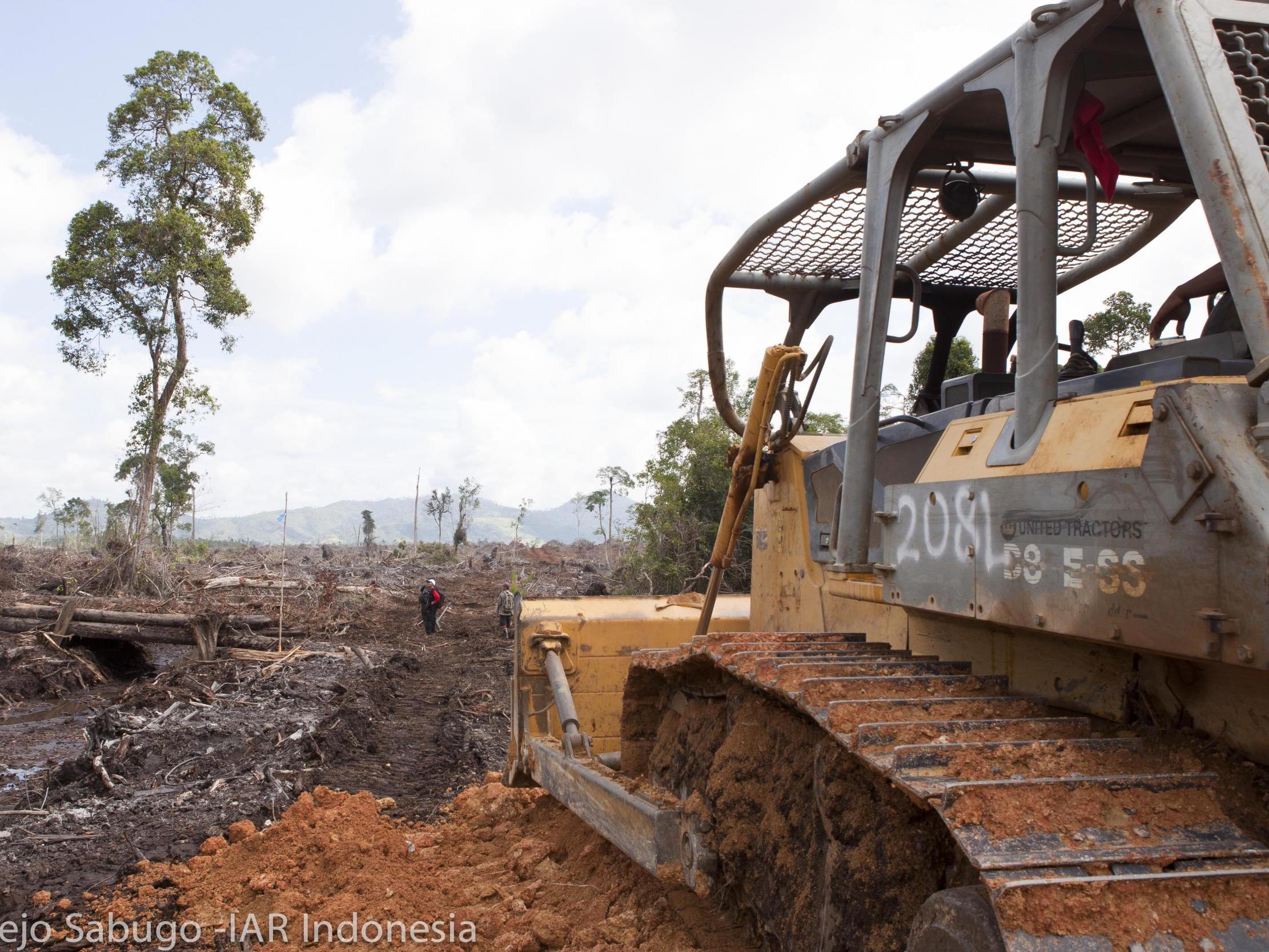'Now or never' battle to save Indonesia’s endangered orangutans as British companies still using 'dirty' palm oil
Exclusive: Activists prepare to reveal 'proof' that brands such as Cadbury’s, Dove and Colgate buy from suppliers razing rainforests at alarming rate
Your support helps us to tell the story
From reproductive rights to climate change to Big Tech, The Independent is on the ground when the story is developing. Whether it's investigating the financials of Elon Musk's pro-Trump PAC or producing our latest documentary, 'The A Word', which shines a light on the American women fighting for reproductive rights, we know how important it is to parse out the facts from the messaging.
At such a critical moment in US history, we need reporters on the ground. Your donation allows us to keep sending journalists to speak to both sides of the story.
The Independent is trusted by Americans across the entire political spectrum. And unlike many other quality news outlets, we choose not to lock Americans out of our reporting and analysis with paywalls. We believe quality journalism should be available to everyone, paid for by those who can afford it.
Your support makes all the difference.Activists are going head-to-head with multinationals in a renewed battle to save orangutans from extinction as the world’s biggest palm oil-producing nation accelerates output.
Greenpeace campaigners have warned “it’s now or never” for Indonesia’s critically endangered orangutans which are being killed at a rate of 25 a day.
They claim to have proof companies making items such as biscuits, bread, soap and shampoo are still using palm oil from producers destroying rainforests – despite having pledged to stop.
Hidden palm oil is in:
- shampoo
- ice cream
- oat cakes
- detergent
- biscuits
- sliced bread
- pizzas
- instant noodles
- margarine
- chocolate
- soap
- lipstick
It goes under names such as:
- palm kernel
- palmate
- glyceryl
- stearate
- stearic acid
- palmitic acid
- sodium laureth sulfate
- sodium lauryl lactylate
Source: WWF
The great apes’ habitats are being torn down en masse in Indonesia and Malaysia to make way for plantations of palm, leaving the animals homeless and unable to survive.
In 2010, many of Britain’s most popular brands pledged that by 2020 they would no longer buy palm oil from any supplier involved in the forest destruction.
They included Unilever, which makes products such as Dove soap and Comfort washing liquid, Nestlé, which makes KitKat and Shreddies, Colgate-Palmolive toothpaste, and Mondelez, which owns Cadbury, producer of Dairy Milk, Flake bars and Roses chocolates.
But the activists claim that after eight years, and with just 18 months to go until the deadline, the firms have done “shockingly little” about the land clearances and have failed to make progress in finding “clean” palm oil sources.
Greenpeace is poised to release a hard-hitting international report revealing its findings on Wednesday.
Over the past 20 years, demand for palm oil has soared because it is so versatile and the trees are so productive: the oil is now an ingredient in half of all British supermarket products, as well as being used to make biofuel.
It is also important to Indonesia’s earnings. More than 36 million tonnes of palm oil were produced there last year, and the 16.4 million tonnes of it sold abroad accounted for more than 12 per cent of exports, according to the Sustainability Policy Transparency Toolkit.
About 50 million Indonesians depend directly or indirectly on palm oil and its derivatives, the Indonesian Palm Oil Association says.
But the rapid rise in plantations has been disastrous for orangutan populations, which have more than halved – from 230,000 a century ago.

In 16 years, 148,000 Bornean orangutans have been wiped out, and all three species are classed as critically endangered – just one step away from being extinct in the wild.
The deforestation is also putting elephants, rhinos and tigers in serious danger, Greenpeace says, with at least two-thirds of Sumatran elephant rainforest habitat destroyed by humans, fewer than 100 Sumatran rhinos left, and only two “robust” breeding Sumatran tiger populations still alive.
The campaigners say they will block bulldozers in rainforests and stop shipments at ports in a drive to disrupt the multi-billion-pound industry and prevent the wildlife extinctions.
But they are also stepping up pressure on food and toiletry giants that add palm oil to everyday products.
The 2010 accord, signed by hundreds of brands, promised changes to create “clean” supply chains within 10 years. Companies also brought in policies pledging no deforestation, no peat and no exploitation (NDPE).
But according to Greenpeace, “with fewer than 500 days to go to live up to their promises, the big brands are still using dirty palm oil in the products they sell to us. They know they are playing a part in rainforest destruction”.
It says its investigators have proved leading brands including Colgate-Palmolive, Unilever, Nestlé and Mondelez are still involved in the destruction despite claiming to be deforestation-free, and it is challenging them to urgently help transform the industry “instead of hiding behind policies”.
An area the size of a football pitch is destroyed every 25 seconds – or 146 every hour – as land is razed, figures show.
Indonesian Ministry of Forestry statistics reveal 24 million hectares of rainforest were destroyed between 1990 and 2015 – an area almost the size of the UK.
Razing forests increases the chances of wild fires erupting as the peatland dries out, destroying habitats still further.
“If the current destruction of the rainforest continues, I have absolutely no hope that any orangutans will remain in the wild,” said Alan Knight, head of charity International Animal Rescue.
But Indonesia appears set on raising its output of palm. President Joko Widodo has ordered measures to boost consumption of locally produced palm-oil biodiesel to cut the use of imported fuels.
And last month its trade minister said Indonesia had pressed to build palm oil jet fuel plants in the US and France as a condition for its airlines to buy Boeing Co and Airbus SE planes.
The government is also working with the private sector to expand exports of palm oil by sending trade mission delegations to Pakistan, whose need for vegetable oil, including palm, is expected to continue to rise as the human population grows.
EU negotiators in June agreed to phase out use of palm oil in transport fuels from 2030 because of concerns over high indirect greenhouse gas emissions.

Food chain Iceland announced earlier this year it would drop all palm oil from its own-brand goods.
Campaigners from Greenpeace and International Animal Rescue – which teaches locals to work without endangering orangutans – say that precisely because palm is a high-yielding crop, enough plantations already exist to meet global demand without devastating any more land.
A Greenpeace spokeswoman said avoiding all palm oil was not the answer – the solution was to convince all food, cosmetics and toiletries companies to source palm oil that was entirely free of habitat destruction.
Unilever said all its suppliers needed to adhere to the company’s “sustainable palm oil sourcing policy” and it was “working to increase traceability in this complex supply chain”. It said it had a roadmap to achieve 100 per cent sustainable palm oil by next year was doing everything in its power to make production sustainable but there was no quick fix.
A spokeswoman for Mondelez said: “We’re making good progress to implement our palm oil action plan. This includes actionable steps to ensure the palm oil we buy is produced on legally held land and does not lead to deforestation or loss of peat land … Greater transparency of complex palm oil supply chains is a core part of these plans, and we published data in March of all the mills where our suppliers buy oil. We’re challenging our suppliers to resolve controversies linked to their supply as soon as possible.”
On Friday, Nestlé announced it would use satellites to monitor palm oil plantations for signs of deforestation, aiming to “speed up” a commitment to “sustainable” sourcing.
A Nestlé spokesman said: “We share the determination to stop deforestation and will continue to work with other parties throughout the supply chain to overcome the many challenges we need to tackle to get to that 100 per cent figure. As of last year, 63 per cent of Nestlé’s supply chain was free of deforestation including 58 per cent for palm oil.”
Colgate-Palmolive said the company was on track to reach 100 per cent sustainable palm oil by 2020. “This year we disclosed the mills that supply us directly from our largest palm oil suppliers, which together account for about 90 per cent of our purchases," the company said in a statement. "We will extend this to additional suppliers as we work toward full disclosure and traceability. We also are implementing tracking tools that include satellite monitoring for signs of deforestation.
“We will continue to work closely with industry partners, suppliers and NGOs to develop effective actions that advance our environmental and social goals and ensure sustainable sourcing across our supply chain.”
Greenpeace does not use the term “sustainable” because it believes it is not clear whether there is such a thing.

Join our commenting forum
Join thought-provoking conversations, follow other Independent readers and see their replies
Comments